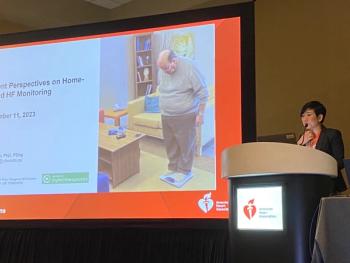
Digital Cognitive Behavioral Therapy for Insomnia Using Your Smartphone Proves Effective
The smartphone-based therapy was developed into an app adapted to Chinese culture for a clinical trial comparing sleep-educated patients to those who use the app, as more than 200 million people in China experience insomnia. Traditional in-person cognitive behavioral therapy for insomnia has become more inadequate due to the large group affected.
A smartphone-based, digital cognitive behavioral therapy geared toward insomnia (DCBT-I) reported to improve the sleep disorder over sleep education efforts.
The digital insomnia app was developed over 10 years ago and has been proven to be effective in insomnia patients in Western countries.
Because studies comparing DCBT-I and sleep education in the same operating interface are lacking, researchers of a randomized clinical trial investigated the efficacy the Chinese culture–adapted app for insomnia compared with sleep education using the same app. Results of the clinical trial, which were collected from March 2021 to January 2022, at Peking University First Hospital in Beijing, were published in
Authors indicate psychological treatments must be appropriate to the cultures in which they are used as previous studies have shown that culturally adapted psychotherapy is superior to conventional psychotherapy.
In this study, Chinese cultural context was used, including the application of local language expressions, introducing some localized activities, such as traditional Chinese calligraphy, and providing the content that is consistent with Chinese lifestyle and patterns of cognition.
Included in the study were 82 participants with 41 randomized to sleep education and 41 randomized to DCBT-I. The participants were observed over 6 weeks, with follow-ups at 1, 3, and 6 months. Data was collected based on Insomnia Severity Index (ISI) scores, diary measures; self-reported scales evaluating dysfunctional beliefs about sleep, mental health, and quality of life; and smart bracelet measures.
Mean (SD) ISI scores in the DCBT-I group were much lower than those in the sleep education group following the 6-week intervention (12.7 [4.8] points vs 14.9 [5.0] points; P = .048) and at the 3-month follow-up (12.1 [5.4] points vs 14.8 [5.5] points; P = .04). There were significant improvements with large effect sizes from before and after the intervention for the sleep education and DCBT-I groups (sleep education: d = 1.13; DCBT-I: d = 1.71).
In addition, some sleep diary measures and self-reported scales showed more improvements in the DCBT-I group than the sleep education group, such as mean (SD) total sleep time (3 months: 403.9 [57.6] minutes vs 363.2 [72.3] minutes; 6 months: 420.3 [58.0] minutes vs 389.7 [59.4] minutes) and sleep efficiency (3 months: 87.4% [8.3%] vs 76.7% [12.1%]; 6 months: 87.5% [8.2%] vs 78.1% [10.9%]).
Though the study formed a significant difference in treating insomnia, it remains to have several limitations. For example, objective evaluation of sleep was performed using a consumer-grade smart bracelet rather than with medical actigraphy, and the quality of sleep parameter measures varies between these products. Also, participants with other sleep disorders, such as periodic limb movement disorder and obstructive sleep apnea, were not excluded from this study. Lastly, there may be a population selection bias, as participants were mainly from Beijing, China.
It’s encouraged that future multicenter clinical trials with large sample sizes are needed to validate its effectiveness in the Chinese population.
Newsletter
Get the latest industry news, event updates, and more from Managed healthcare Executive.






















